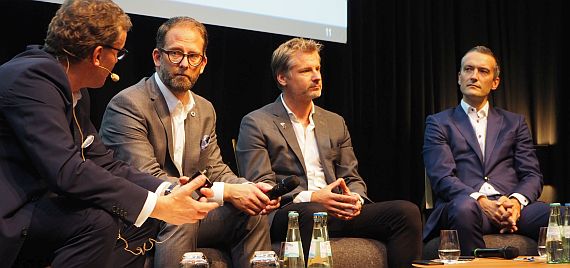
News & Stories
Hamburg. The German population is ageing but still wants to travel. In addition, there has been progress on the topic of inclusion in society. This inevitably increases the need for barrier-free hotel rooms. A current study supports this trend.
London. Between the lines it became clear how difficult it is today for CEOs to make strategic decisions. IHG-CEO Keith Barr and Federico J. González, President & CEO Radisson Hotel Group, also feel driven by technology, consumers and staff.
Lausanne. The City of Lausanne and EHL Group have concluded an agreement for the development and refurbishment of the Lausanne city district Chalet-à-Gobet. It’s here that Europe's first innovation hub for hospitality is to be created.
Dubai/Bangkok. Global Hotel Alliance has received substantial investments from two new shareholders: Singapore-based Pan Pacific Hotels with two brands and Bangkok-based Minor Hotels with more than160 hotels under several brands and since last Friday also the new majority owner of NH Hotels.
Toronto/Paris. "What would happen if we knew all your desires? If we could predict all your needs?", asked AccorHotels in a press release in July this year, and promised: "With Seeker, the customer loyalty programme Le Club AccorHotels will be able to make all this come true" – with the aid of biometric data such as brainwaves and pulse rate. Which desire do I have if my pulse is high? AccorHotels is able to do many things and the company tries many things. But will this one work? And how? It sounds like a personalised fairy tale. Baerbel Schwertfeger did some research, AccorHotels is keeping silent.
Munich. The brand chaos knows no bounds, but it's obviously viewed as a "necessary evil" and so accepted in the hotel sector that nobody appears to be bothered by the flood of brands entering the market. At least this was how it seemed at the Expo Real hotel conference where host, Prof Christian Buer, managed to get brand specialists from AccorHotels, citizenM and arcona Hotels to give details on the positioning of brands today, though failed to coax statements out of them as to where the downside of this development lies. Interestingly, brand awareness is no longer as important as it once was. The brand has to adjust better to the location and target group.
Munich. They are chic and trendy and often more streamlined in operations than their competitors. But how are boutique and lifestyle hotels doing in A locations in terms of occupancy and average room rate compared to "traditional" hotels? A current assessment by STR revealed: BL hotels are catching up in terms of their KPIs. STR took a closer look at three important European markets: London, Amsterdam and Munich. The data research company presented the result exclusively at the "Hospitality Industry Dialogue" at Expo Real in Munich.
Bethesda/Copenhagen. The relationship between Marriott International and the – involuntarily acquired – brand Design Hotels will take on a new quality over the next 24 months. The owners of individual hotels must decide whether they wish to remain a Design Hotel Classic with the same loyalty benefits as up to now or whether they want to spend more money in order to benefit from the chain’s own mega loyalty programme. Or whether they wish to exit.
Munich. Since a few weeks the world's first room-shopping robot has been in operation on one floor of the Rilano Hotel Munich. It brings drinks, snacks and more to the guest's room door. The guest even orders directly from him.
Madrid. The NH board believes Minor is undervaluing the company and has rejected its takeover bid. The decision is now in the hands of the shareholders.



